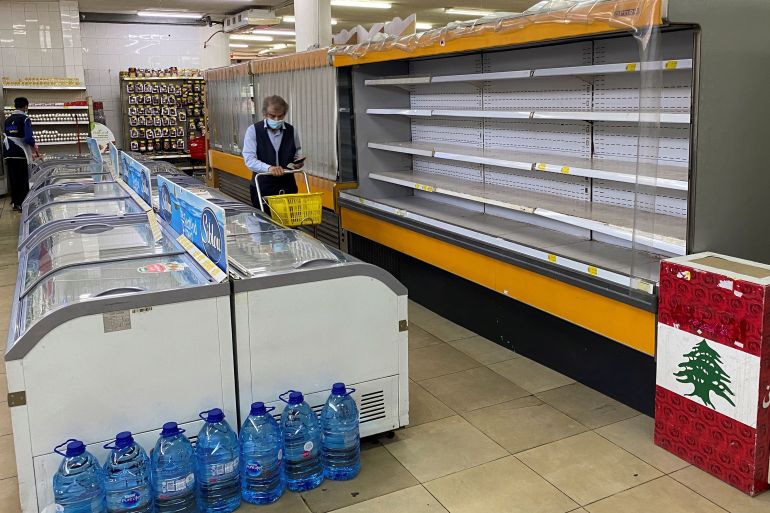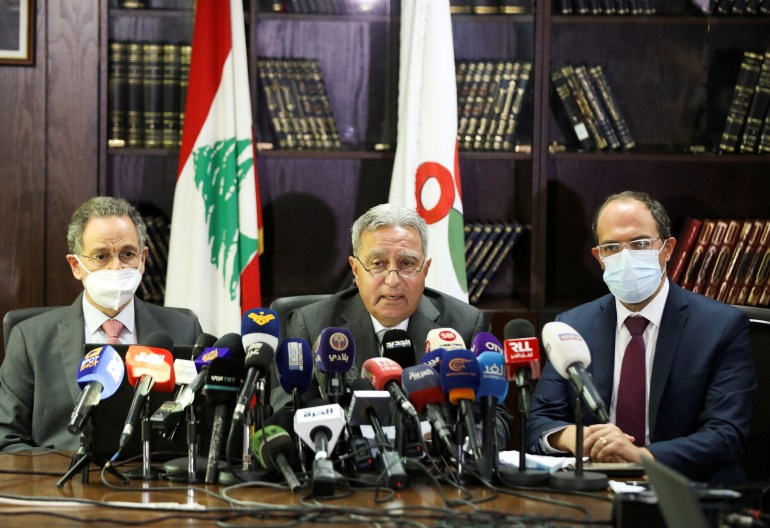Lebanon launches cash card programme. Who will it really benefit?
Lebanon launches initiative to throw a financial lifeline to vulnerable families but some fear the programme will only prolong the influence of elites who have brought the country to ruin.

Beirut, Lebanon – Lebanon’s caretaker social affairs and economy ministers have announced a long-awaited cash card programme to throw a desperately needed financial lifeline to half a million vulnerable families.
“It is your right to live in dignity,” caretaker Social Affairs Minister Ramzi Moucharafieh said during a press conference in Beirut on Thursday. “I am as proud to have launched this card programme as I am sad about Lebanon reaching this stage in what it’s going through.”
Keep reading
list of 4 items‘Triple spending’: Zimbabweans bear cost of changing to new ZiG currency
‘We share with rats’: Neglect, empty promises for S African hostel-dwellers
Thirty years waiting for a house: South Africa’s ‘backyard’ dwellers
The cash card programme will be active for one year and provide $25 for each individual in a household, with a maximum payout of $126 per family. Citizens over 64 years old receive an additional $15.
Registration for eligible families and individuals starts next week with the aim of starting disbursements in October.
Lebanon has been in the throes of a political and economic crisis since 2019 that has decimated the finances of ordinary families, plunging millions of people into poverty. The Lebanese pound has shed 90 percent of its value on the parallel market, reducing the country’s national minimum wage of 675,000 pounds to little more than $35.
In a bid to assure the country that the cash card programme would not fall victim to corruption and nepotism, caretaker Economy Minister Raoul Nehme said recipients will be vetted to weed out the affluent and ensure fair distribution to poorer families. He also said the programme will work closely with Central Inspection to ensure transparency, digital security and effective oversight.

“There will also be foreign auditing,” Nehme said during the joint press conference with Moucharafieh and head of Central Inspection Judge Georges Attieh. “Our vetting system will ensure only families in need benefit from this programme.”
But some economists question official assurances.
“Even though they claim otherwise, there will be no effective accountability or transparency measures,” Sami Zoughaib, an economist at Lebanese think-tank the Policy Initiative told Al Jazeera. “The concerns are not different than the usual risks that come with public provision in Lebanon; these cards can be used for electoral purposes, with general elections scheduled for next May.”
The programme’s payments will be disbursed through electronic cards or money transferring offices, depending on the families. Both Nehme and Moucharafieh said they hope payments will be delivered in US dollars, similar to the country’s existing National Poverty Targeting Program. It is unclear though whether families will receive benefits in greenbacks or Lebanese pounds.
“We’re waiting for the final decision from the central bank and the finance ministry – whether or not we will disburse the cash in US dollars or Lebanese pounds at the parallel rate,” Nehme said.
According to the United Nations, almost three-quarters of the country’s population live in poverty.
With virtually no state electricity in recent months and diesel fuel shortages to power small private generators, Lebanon has been plagued with prolonged power cuts where even hospitals have struggled to keep their lights on and equipment working. Bread prices continue to increase intermittently, medicines have been missing from pharmacy shelves and drivers continue to wait for hours at a time in long queues to partially top up their vehicles.
Lebanon has struggled to maintain an expensive blanket subsidies programme on wheat, fuel and medicines as the central bank’s foreign currency reserves have dwindled.
While government subsidies kept the prices of these goods affordable, economists have said it has primarily benefitted families with greater purchasing power, rather than the vulnerable. Smuggling and hoarding are rampant.
“After seeing that subsidies are reaching people who deserve it and those who don’t, so slowly lifting subsidies became necessary,” Moucharafieh said.
But Zoughaib contends that band-aid fixes like subsidies and the cash card programme will do little to help the nation as a whole, and only shore up the influence of elites who have so far failed to deliver an economic reform plan international donors are demanding as a pre-condition for unlocking billions of dollars in desperately needed aid for the country.
“The only effective solution that can make sense on a financial and social level would be a full-fledged recovery plan, with a strong social protection framework,” Zoughaib said. “Otherwise, any decision taken would only be patchwork to extend the life of the country’s ruling elite.”